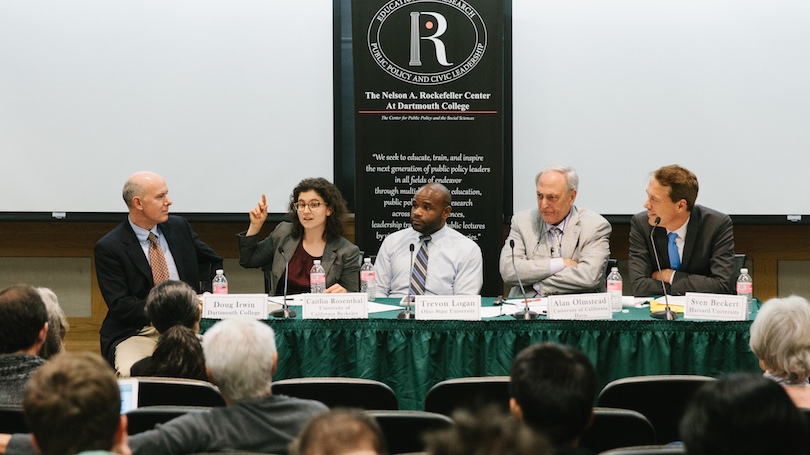
- Public Policy
- Leadership
- Funding
- News & Events
- About the Center
Back to Top Nav
Back to Top Nav
Back to Top Nav
Back to Top Nav
We all know the booming effect that slavery had on the South’s economy. But is it possible that it was crucial to the development of the nation’s being as a whole? Would American capitalism have achieved its current structure without it? Some have contended that the surplus generated by slavery was key to the development of industrial capitalism. Economists are skeptical of such a link. Regardless, many historians and economists have a renewed interest in the relationship between the central forces of American capitalism, its origins, and how it has been influenced by slavery.
On Thursday, October 20th, this symposium analyzed the origins of American capitalism in tandem with its relationship with slavery. The panelists debated the necessity of slavery to industrial capitalism. From historic and economic standpoints, the impact of slavery on capitalism is hotly contended; essential elements of these linkages were discussed by the interdisciplinary panel.
The panelists include Sven Beckert, the Laird Bell Professor of History at Harvard University; Trevon D. Logan, Hazel C. Youngberg Trustees Distinguished Professor of Economics at Ohio State University; Alan L. Olmstead, Distinguished Research Professor at University of California, Davis; and Caitlin Rosenthal, Assistant Professor of History at University of California Berkeley.
Sven Beckert researches and teaches the history of the United States in the nineteenth century. His work is focused on the history of capitalism, including its economic, social, political and transnational dimensions. His recently published book Empire of Cotton: A Global History was the first global history of the nineteenth century’s most important commodity. It won the Bancroft Award, The Philip Taft Award, the Cundill Recognition for Excellence and was a finalist for the Pulitzer Prize. Professor Beckert is co-chair of the Program on the Study of Capitalism at Harvard University, and co-chair of the Weatherhead Initiative on Global History (WIGH).
Trevon D. Logan is the Hazel C. Youngberg Trustees Distinguished Professor in the Department of Economics at Ohio State University in addition to being a Research Associate at the National Bureau of Economic Research. Mr. Logan is the youngest-ever president of the National Economics Association and was awarded the 2014 Alumni Award for Distinguished Teaching His research mainly focuses on economic history, including studies of African American migration, economic analysis of illegal markets, the economics of marriage transfers, and measures of historical living standards.
Alan L. Olmstead is a Distinguished Research Professor at the University of California, Davis. He has authored several articles on slavery and southern economic development. Some of his works include Arresting Contagion, analyzing how federal disease-control policies redefined the boundaries of American federalism and states’ rights, and Creating Abundance: Biological Innovation and American Agricultural Development. Professor Olmstead is a former president of both the Economic History Association and the Agricultural History Society, and the past director of the All University of California Group in Economic History. He currently serves on the Board of Directors of the National Bureau of Economic Research.
Caitlin Rosenthal is Assistant Professor of History at the University of California, Berkeley. Her research explores the development of quantitative management practices and seeks to blend methods and insights from business history, economic history, and labor history. Her current book project, tentatively titled Accounting for Slavery, uses plantation record books to explore the complex relationship between slavery and capitalism in American history.
The panel’s moderator is Douglas Irwin, the John Sloan Dickey Third Century Professor in the Social Sciences in the Department of Economics at Dartmouth College. He is a Research Associate of the National Bureau of Economic Research and has also served on the staff of the President's Council of Economic Advisers and the Board of Governors of the Federal Reserve System.
Submitted by Alexa Green ’19, Rockefeller Center Student Program Assistant for Public Programs
The views and opinions expressed and any materials presented during a public program are the speaker’s own and do not necessarily represent the views and opinions of the Rockefeller Center or constitute an endorsement by the Center.